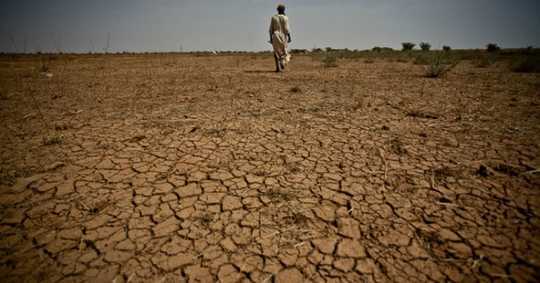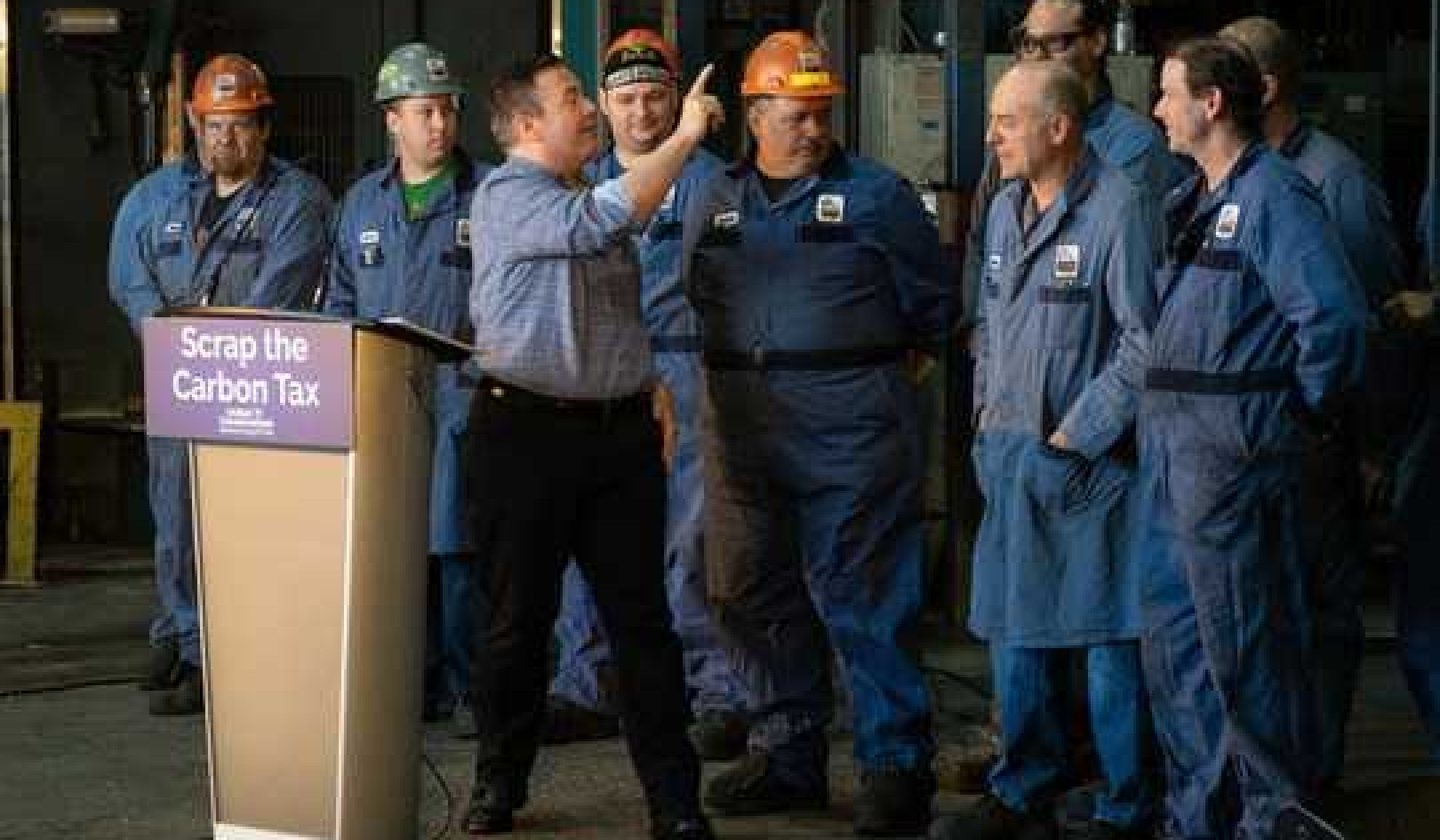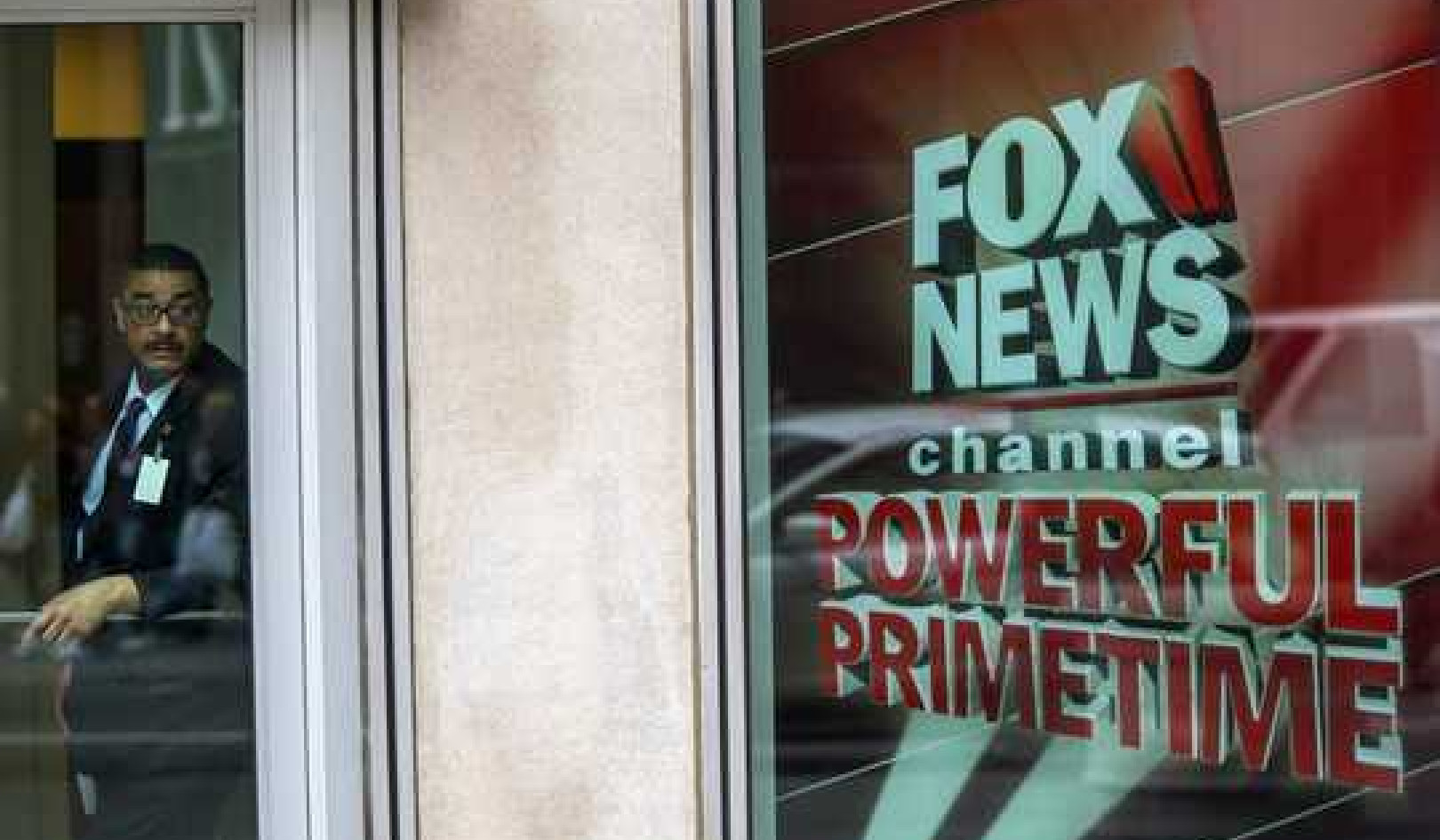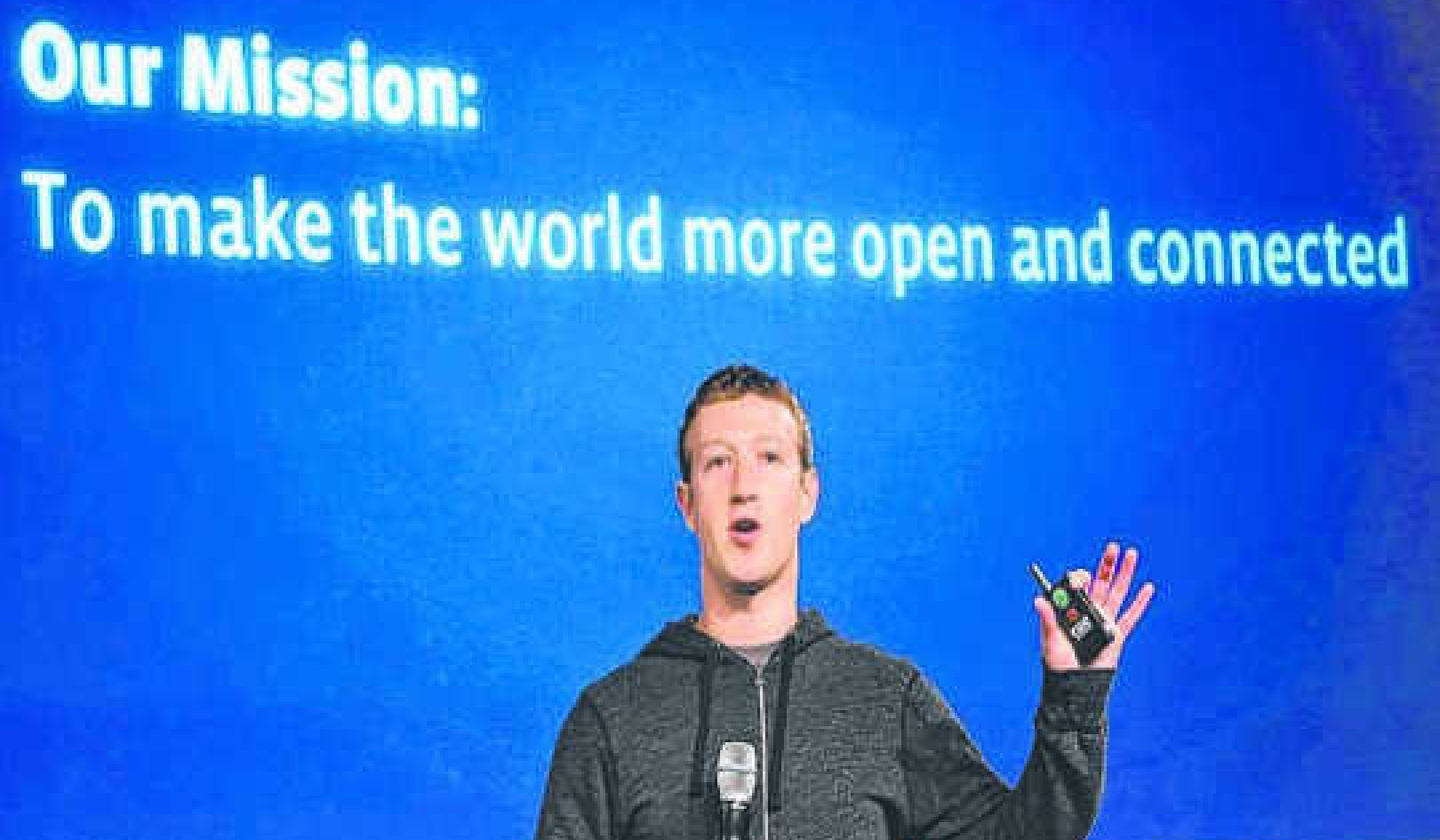
"There is no denying it: The longer we wait to take bold action to curb emissions, the higher the costs will be for all of us."
Arid soils are shown in Mauritania in 2012, when crops failed because of a severe drought which led to a food crisis that impacted millions of people across West Africa. (Photo: Oxfam International/Flickr/cc)
Noting previous warnings that the human-caused climate crisis could cause trillions of dollars in damage to the global economy by the end of the century, a new report from Moody's Analytics explores the economic implications of the international community's failure to curb planet-warming emissions.
Moody's Analytics chief economist Mark Zandi told The Washington Post—which first reported on the new analysis—that this is "the first stab at trying to quantify what the macroeconomic consequences might be" of the global climate crisis, and it comes in response to European commercial banks and central banks. The climate emergency is "not a cliff event. It's not a shock to the economy. It's more like a corrosive," Zandi added. But it is "getting weightier with each passing year."
The financial research and consulting firm's analysis (pdf) highlights a few key projections from a report published last October by the U.N. Intergovernmental Panel on Climate Change (IPCC): if the average global temperature soars to 1.5°C above pre-industrial levels—the lower limit of the Paris climate agreement—the cost to the global economy is estimated to be $54 trillion in 2100, and under a warming scenario of 2°C, the cost could reach $69 trillion.
Moody's—whose clients include multinational corporations, governments, central banks, financial regulators and institutions, retailers, mutual funds, utilities, real estate firms, insurance companies, and investors—notes researchers have found that "warming beyond the 2°C threshold could hit tipping points for even larger and irreversible warming feedback loops, such as permanent summer ice melt in the Arctic Ocean."
One of the key takeaways, the report emphasizes, is that economically, "the more draconian effects of climate change are not felt until 2030 and beyond. And they do not become especially pronounced until the second part of the century."
"That's why it is so hard to get people focused on this issue and get a comprehensive policy response," Zandi told the Post. "Business is focused on the next year, or five years out."
"Most of the models go out 30 years," he said, "but, really, the damage to the economy is in the next half-century, and we haven't developed the tools to look out that far."
Responding to the Post report, which emphasized Moody's warning of the anticipated damage to the global economy, some advocates of ambitious global action to slash human-generated greenhouse gas emissions pointed to recent findings from climate experts that the world's temperature could rise 3°C or higher by 2100, implying that the economic costs could exceed the IPCC's upper estimate.
Moody’s Analytics estimates climate change impacts will cost the global economy up to $69 trillion by the end of the century,
— Paul Dawson on Climate Change (@PaulEDawson) July 3, 2019
The $69 trillion estimate is derived assuming warming hits the 2°C threshold,
We're currently on track for 3°C rise https://t.co/gZd3jt7Tp6
Linking to the Post report, Defend Our Future—a project of the Environmental Defense Fund that aims to empower young people interested in advancing climate and clean energy solutions—tweeted: "There is no denying it: The longer we wait to take bold action to curb emissions, the higher the costs will be for all of us."
There is no denying it: The longer we wait to take bold action to curb emissions, the higher the costs will be for all of us. #ClimateCrisis #ClimateActionNow https://t.co/n9n1h6u7b1
— Defend Our Future | #ActOnClimate (@DefendOurFuture) July 3, 2019
Moody's analysts examined the climate emergency's expected economic damage across six impact channels—sea-level rise, human health effects, heat effect of labor productivity, agricultural productivity, tourism, and energy demand—and created forecasts through 2048.
"This analysis reveals that some countries are significantly exposed to rising temperatures while others, particularly in Northern Hemisphere climates, are well insulated," the report says. Those at the greatest risk, analysts found, are "countries in hot climates, particularly those that are emerging economies such as Malaysia, Algeria, the Philippines, and Thailand, and oil producers such as Saudi Arabia, Qatar, and Oman."
On the agricultural front, rising temperatures are expected to impact both the health of farmworkers and crop yields, which particularly threatens less-developed nations that are economically dependent on farming. Echoing a U.N. report published this week, Moody's notes that "heat stress, determined by high temperature and humidity, lowers working speed, necessitates more frequent breaks, and increases the probability of injury."
The report says that in terms of human health, the number of heat-related deaths worldwide is expected to increase as the global temperature does, and a hotter world "can lengthen the season and increase the geographic range of disease-carrying insects such as mosquitoes, ticks, and fleas, allowing them to move into higher altitudes and new regions."
Recognizing some limitations of its analysis, Moody's acknowledges that "there are a number of factors that were not considered in this work. The foremost of these is the increasing frequency and severity of natural disasters." The report points to a U.S. government calculation that in the United States alone, disasters caused more than $300 billion in damage in 2017.
As the environmental legal organization Earthjustice concluded in response to the report, "We literally cannot afford inaction on this crisis."
This article originally appeared on Common Dreams
About The Author
Jessica Corbett is a staff writer for Common Dreams. Follow her on Twitter: @corbett_jessica.
Related Books
Life After Carbon: The Next Global Transformation of Cities
by Peter Plastrik , John Cleveland The future of our cities is not what it used to be. The modern-city model that took hold globally in the twentieth century has outlived its usefulness. It cannot solve the problems it helped to create—especially global warming. Fortunately, a new model for urban development is emerging in cities to aggressively tackle the realities of climate change. It transforms the way cities design and use physical space, generate economic wealth, consume and dispose of resources, exploit and sustain the natural ecosystems, and prepare for the future. Available On Amazon
The future of our cities is not what it used to be. The modern-city model that took hold globally in the twentieth century has outlived its usefulness. It cannot solve the problems it helped to create—especially global warming. Fortunately, a new model for urban development is emerging in cities to aggressively tackle the realities of climate change. It transforms the way cities design and use physical space, generate economic wealth, consume and dispose of resources, exploit and sustain the natural ecosystems, and prepare for the future. Available On Amazon
The Sixth Extinction: An Unnatural History
by Elizabeth Kolbert Over the last half-billion years, there have been Five mass extinctions, when the diversity of life on earth suddenly and dramatically contracted. Scientists around the world are currently monitoring the sixth extinction, predicted to be the most devastating extinction event since the asteroid impact that wiped out the dinosaurs. This time around, the cataclysm is us. In prose that is at once frank, entertaining, and deeply informed, New Yorker writer Elizabeth Kolbert tells us why and how human beings have altered life on the planet in a way no species has before. Interweaving research in half a dozen disciplines, descriptions of the fascinating species that have already been lost, and the history of extinction as a concept, Kolbert provides a moving and comprehensive account of the disappearances occurring before our very eyes. She shows that the sixth extinction is likely to be mankind's most lasting legacy, compelling us to rethink the fundamental question of what it means to be human. Available On Amazon
Over the last half-billion years, there have been Five mass extinctions, when the diversity of life on earth suddenly and dramatically contracted. Scientists around the world are currently monitoring the sixth extinction, predicted to be the most devastating extinction event since the asteroid impact that wiped out the dinosaurs. This time around, the cataclysm is us. In prose that is at once frank, entertaining, and deeply informed, New Yorker writer Elizabeth Kolbert tells us why and how human beings have altered life on the planet in a way no species has before. Interweaving research in half a dozen disciplines, descriptions of the fascinating species that have already been lost, and the history of extinction as a concept, Kolbert provides a moving and comprehensive account of the disappearances occurring before our very eyes. She shows that the sixth extinction is likely to be mankind's most lasting legacy, compelling us to rethink the fundamental question of what it means to be human. Available On Amazon
Climate Wars: The Fight for Survival as the World Overheats
by Gwynne Dyer Waves of climate refugees. Dozens of failed states. All-out war. From one of the world’s great geopolitical analysts comes a terrifying glimpse of the strategic realities of the near future, when climate change drives the world’s powers towards the cut-throat politics of survival. Prescient and unflinching, Climate Wars will be one of the most important books of the coming years. Read it and find out what we’re heading for. Available On Amazon
Waves of climate refugees. Dozens of failed states. All-out war. From one of the world’s great geopolitical analysts comes a terrifying glimpse of the strategic realities of the near future, when climate change drives the world’s powers towards the cut-throat politics of survival. Prescient and unflinching, Climate Wars will be one of the most important books of the coming years. Read it and find out what we’re heading for. Available On Amazon
From The Publisher:
Purchases on Amazon go to defray the cost of bringing you InnerSelf.comelf.com, MightyNatural.com, and ClimateImpactNews.com at no cost and without advertisers that track your browsing habits. Even if you click on a link but don't buy these selected products, anything else you buy in that same visit on Amazon pays us a small commission. There is no additional cost to you, so please contribute to the effort. You can also use this link to use to Amazon at any time so you can help support our efforts.






























